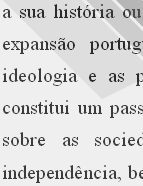

................................
Francisco Castelbranco's História de Angola [History of Angola], published in Luanda in 1932, proved to be more fluid, descriptive and 'Africanised'. This author, who belonged to Angola's mestizo petit bourgeoisie, was not a qualified historian either. Aware of the difficulties, the fragilities and the shortcomings of his work, but considering the task of providing "the means to learn about the History of Angola" (1932, Prefácio [Preface]) to be urgent, the author did not hesitate to undertake the inventory of knowledge, advancing to the organisation of an Angolan history in 22 chapters with no methodological concerns, dragging the Africans, even if by the patronising and fraternal hand of the Portuguese hero, to the front line of his written discourse. While his writing was overly descriptive and never sufficiently analytical, Francisco Castelbranco brought to light an important mass of information and highlighted the importance of Africans in the fabrication of their history, associating them with the events brought about by Portuguese interventions. Contrary to most histories of Angola, the author sought to record the major Angolan facts on a level identical to that of Portuguese and international events, while also focusing on issues deemed 'minor' by Portuguese historiography - the daily lives of the Angolans and the local situations that marked their lives such as epidemics, droughts, famines – while not leaving aside the exercise of administrative authority, the Portuguese and Angolan troops, the improvements implemented such as the construction of railways, white colonisation, the economic situation, the colony's finances, to mention only 20th-century issues (1932, 255-256).
Notwithstanding all its methodological flaws, this history of Angola has the merit of seeking to open up an autonomous space for Africans within their own history, rejecting the idea of African passivity in the historical transformation processes, which marked Portuguese historiography in relation to the Other. In the twenty-first century, Portuguese historiography, which has witnessed great advances in themes of Portuguese history that were silenced by the Estado Novo, has not yet been able to or known how to systematically 'decolonise' historical reflection on the colonial issue in its most complex dimensions, enhance the history of colonised peoples without prejudice and acknowledge the importance of these peoples for the renewal of Portuguese history.
